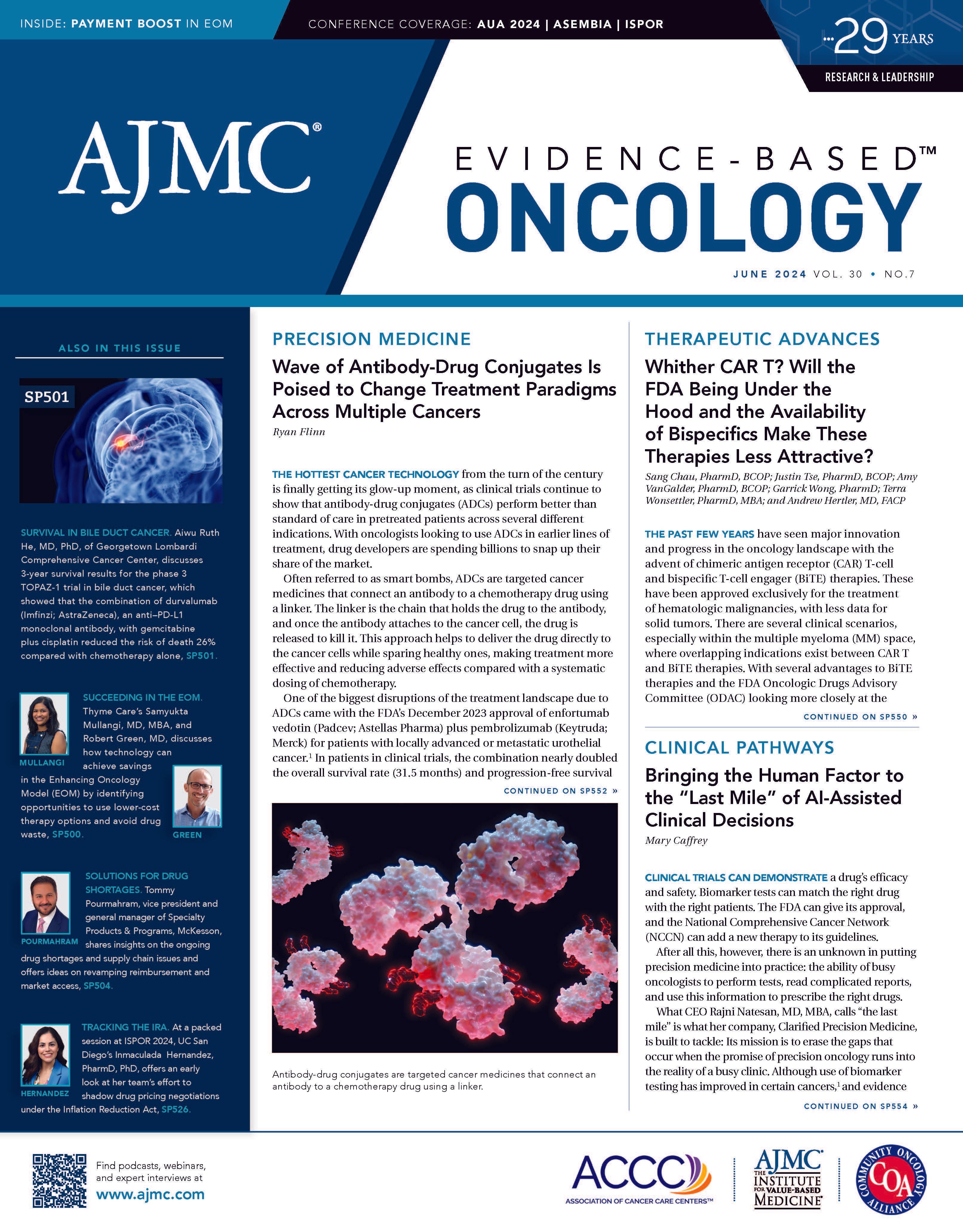- Center on Health Equity & Access
- Clinical
- Health Care Cost
- Health Care Delivery
- Insurance
- Policy
- Technology
- Value-Based Care
Implementing Treatment Escalation Plans in Oncology Care at Admission Boosts Uptake, Study Finds
The implementation of treatment escalation plans (TEPs) can be especially beneficial for patients and providers when completed within 72 hours of admission in an oncology care setting, and continued education of new medical staff is essential to ensure TEPs remain a routine part of oncology admissions, according to a quality improvement study published in BMJ Open Quality.1

“The lack of TEP forms being filled out in patients admitted to hospital can lead to the inappropriate referral to intensive care or patients being denied a higher level care which they may have benefited from,” the researchers of the study wrote. “It is an essential issue in oncology, owing to the specialist treatment regimens, variable prognoses and risk of deterioration.”
TEPs have increasingly become appreciated tools in modern health care settings due to their ability to record and advise patients and providers on appropriate escalation of care. A previous study found TEPs provided enhanced clarity in planning appropriate decision-making in the management of deteriorating patients in an orthopedic care setting.2
A baseline study conducted in September 2021 found only 22% of patients who were admitted under oncology at Northampton General Hospital had TEP forms completed within 72 hours of admission. This study aimed to significantly and sustainably improve the number of patients who completed TEP forms at the time of hospital admission.
Data were collected over a 1-month period, with the sample varying between 27 to 71 patients, and a mean (SD) of 40 patients surveyed per month from October 2021 to May 2023.
The researchers recorded which patients were admitted from daily handover lists and clinical notes, which identified how many patients had a TEP form in place and how many had forms within 72 hours of their admission.
Additionally, the researchers would make recommendations for change based on data collection from each month and implement these changes in the intervention months. Feedback was received from those involved in patient care, including nurses, junior doctors, and consultants.
At cycle 1 of data collection in November 2021, the researchers implemented of a poster reminding staff that TEPs need to be filled out within 72 hours of a patient being admitted, discussion at board rounds and multidisciplinary team (MDT) meetings, and the insertion of blank TEP forms in clinical notes.
These implementations improved the rate of TEP completion within 72 hours of admission from 22% in September 2021 to 44% in November 2021. Additionally, a marked improvement to 83% in February 2022 in cycle 2 was seen following a policy change of TEP form completion upon admission, which also improved clarity for the team responsible for doing so.
The researchers encountered a challenge to sustain these changes and observed a fall in performance during cycle 3 in October 2022. However, through engagement with an almost entirely new junior and registrar-level workforce, the rate of TEP form competition was sustained in cycles 4 and 5 through education and encouraging attendance at board rounds and MDT meetings. For example, 80% of patients had TEP forms completed within 72 hours of admission during cycle 4 in February 2023, which continued to improve to 91% during cycle 5 in May 2023.
However, the researchers acknowledged some limitations to the study, including not surveying patients on the extent to which they care about TEPs and about having these conversations with their doctors.
Despite these limitations, the researchers believe the study highlights the importance of implementing education and awareness to increase the completion of TEP forms by providers within 72 hours of admission in an oncology setting.
"This project has illustrated that a policy of completing TEP forms on admission, as part of the initial clerking, can significantly increase completion rates,” wrote the researchers. “Continued education and engagement with new colleagues is vital to ensure this is sustained.”
References
1. Chauhan HA, Adat R, Garofide H, et al. Quality improvement: treatment escalation plans in oncology. BMJ Open Quality 2024;13:e002625. doi:10.1136/bmjoq-2023-002625
2. Pattnaik S, Zarifian A, Sidhu GA, Punwar S. Improving completion rates of treatment escalation plan (TEP) in a london teaching hospital: A Quality Improvement Study. Cureus. Published online November 26, 2023. doi:10.7759/cureus.49434

